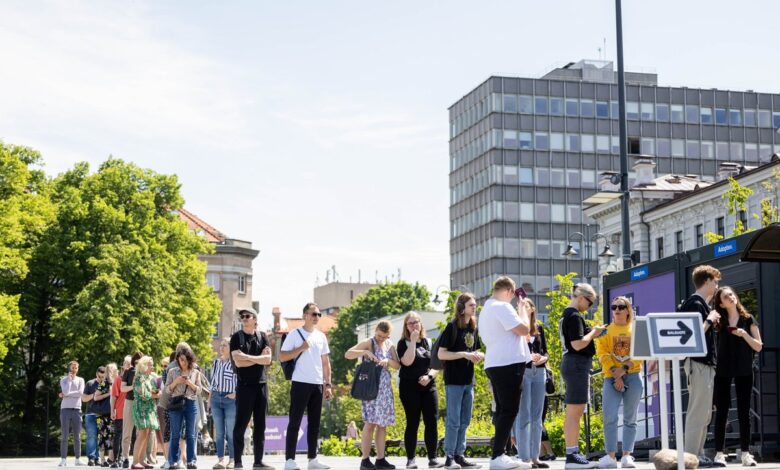Lithuania is to hold a referendum on the retention of Lithuanian citizenship

The referendum presents a significant opportunity for Lithuania
According to Agita Beržanskaitė, the chairman of the World Lithuanian Youth Association (LWYA), the referendum that will be held on 12 May 2024 will propose to approve the amendment of Article 12 of the Constitution. The said Article deals with the rules relating to the acquisition of the citizenship of the Republic of Lithuania.
„The amendment foresees the possibility of retaining Lithuanian citizenship after acquiring citizenship of another country that is regarded as friendly to Lithuania,“ explained Beržanskaitė.
According to her, the referendum presents a splendid opportunity for Lithuania to make a huge step forward.
„In the context of gradual globalization, such opportunity for those of Lithuanian origin equals their recognition as Lithuanians, regardless of where they reside. The contribution to the development of our country is possible in any part of the world, and our country is not going to forget about or distance itself from any of its citizens,“ emphasized Beržanskaitė.
The huge significance of the referendum is highlighted in the insights shared by Marius Gurskas, the head of the Government’s Communications Department.
„Our country is among very few in Europe where citizenship is lost upon acquiring the passport of another country. Such principle is imposed by Article 12 of the Constitution which is currently in force. For individuals whose decision to acquire citizenship of some other country might be forced by specific circumstances, the Article basically forbids retaining Lithuanian citizenship that was acquired by birth. Approximately 1,000 Lithuanians lose their Lithuanian citizenship every year. This issue is of great importance for the future of our country,“ said Gurskas.
In fact, such a referendum was held in 2019, however, the desired results were not achieved.
„In 2019, the referendum had a turnout of 53.16% with 1,322,135 eligible voters participating, thus it was deemed to have taken place. Although 956,564 voters were in favor of retaining citizenship, their number had not reached the percentage required by the Constitution for the decision to be adopted. For the amendment of the constitutional provision to be adopted through a referendum, it had to be supported by at least 1.2 million Lithuanian citizens,“ explained Gurskas.

In the meantime, it is expected that no less than 60% of Lithuanian citizens will take part in the upcoming referendum.
What should young people know about the referendum?
The possibility of retaining citizenship, which is the subject of the referendum that will be held in May, is particularly important for Lithuanians residing abroad. Beržanskaitė has provided some reasons explaining why the issue is so relevant.
„There are plenty of factors and circumstances determining people’s decision to reside abroad. These can be studying perspectives, better employment opportunities, or various other reasons. It should be noted that such individuals not only try to adapt to the new environment but also willingly engage in diaspora activities. As time goes by, however, people get used to the realities of foreign countries. Eventually, they take root there. Some of them can get married or start a promising career. As acquiring citizenship of a foreign country greatly simplifies routine procedures and liberates from various obligations, it is considered to be beneficial to become a citizen in the country of residence. However, one of the hardest dilemmas in this case is the question of the retention of the citizenship acquired at birth,“ said Beržanskaitė.

She believes that the price of such a decision, namely, the deprivation of Lithuanian citizenship, is arguably too high. However, most people agree to pay the cost.
„If the referendum is deemed having taken place and if its outcome is favorable, the said dilemma would disappear. Lithuanians scattered all over the world could easily become citizens of their country of residence and retain Lithuanian citizenship. If such a possibility existed, our country would not lose its citizens and acquire ties with other countries which would be beneficial for it,“ argued Beržanskaitė.
According to Beržanskaitė, young people of Lithuania should understand that the retention of citizenship is a matter of national security.
„Young Lithuanians should understand that the opportunity to retain Lithuanian citizenship when acquiring citizenship in a friendly country strengthens the cooperation between the countries that foster democracy. In fact, such people can serve as a reliable foundation to rely upon in the event of a threat to Lithuania,“ explained Beržanskaitė.
As Beržanskaitė maintains, the successful outcome of the referendum would have an extremely positive impact.
„We are about to offer the opportunity to remain Lithuanians. I think it is a highly positive message. Lithuania should embrace globalization trends and treasure its citizens, regardless of where they live. Of course, such an opportunity foresees all the civic responsibilities that Lithuanian citizens should accept. This is an important aspect of the country’s development,“ said Beržanskaitė.

A very important message for young Lithuanians
Although such concepts as good civic behavior and civic responsibilities are gaining more and more attention nowadays, it is no secret that young people’s engagement in political and democratic processes is usually not sufficient. Beržanskaitė shared her thoughts on possible reasons in this regard.
„The life of a young individual is filled to capacity. It is brimming with various opportunities and activities. Therefore, it is not always easy to identify the priorities. For youngsters, real life is only starting, and it takes time to understand that voting is an important civic duty,“ said Beržanskaitė.
However, casting a vote is a direct participation in country governance, therefore participation in elections is an important duty that should be taken seriously.
„By voting, people express their will which is their viewpoint on the country’s governance and the acceptable policies. The lower the voter turnout, the smaller the portion of the society that is represented by the authorities. Drastic as it may sound, when disregarding the right to vote we automatically condemn ourselves to obeying decisions made by others. Everyone eligible to vote should think of such a prospect,“ noted Beržanskaitė.

She suggested that one possible solution to political apathy among the younger generation could be various citizens’ initiatives.
„The young generation should be encouraged to take a more active part in policy-making processes. This can be done through various events, discussions, and social media campaigns dedicated to citizen engagement. It is assumed that civic education efforts can have a positive effect on the political attitudes of young adults,“ stated Beržanskaitė.
As added by the chairman of the LWYA, the right to vote can be seen not merely as a duty but also as a privilege.
„Democracy, in its essence, is an outcome of the efforts made by the free society. We should enthusiastically embrace our right to vote and view it as a privilege. In Russia, for example, the votes are falsified and people are prevented from voicing their opinion on the country’s policy. But we, Lithuanians, are given such a chance. In the upcoming referendum, the voters are invited to make a very important decision. In doing so they should feel responsible for the future of our country. Those who are eligible to vote will determine the direction of our country. I, therefore, strongly encourage all voters to dwell upon the role that is bestowed on them,“ said Beržanskaitė.

Answers to frequently asked questions
Gurskas emphasized that language, territory, and citizens are the primary attributes of any country, as they define its structure and ensure its proper functioning. Therefore, participating in the referendum is a duty of any civic-minded individual.
„The question on the table is very important for the country’s future. Our collective decision will determine how many Lithuanians there will be and how many people will contribute to the prosperity of our country,“ said Gurskas.
However, as far as the essence and objectives of the referendum are concerned, there still are some points that need to be clarified.
„Young people usually ask questions about the civil resistance and the list of countries considered to be friendly to Lithuania. It should be noted, that citizenship is a delicate issue, therefore even after the referendum it will remain the focus of attention for the government. We should not worry that the question will be settled once and for all. For instance, military service performed in another EU member state could be credited in Lithuania, whereas the countries outside the EU, such as Switzerland, will be the object of a separate discussion,“ explained Beržanskaitė.

According to her, the list of countries friendly to Lithuania will never deemed to be final.
„Every inclusion and every exclusion will be a question for discussion,“ assured Beržanskaitė.
In the meantime, however, it could be useful to learn how the voting will be arranged. The head of the Government’s Communications Department agreed to provide some information.
„The precise wording of the amendment put to the referendum is as follows: „Citizenship of the Republic of Lithuania shall be acquired by birth or on other grounds established by law. The procedure for the acquisition and loss of citizenship shall be established by law.“ The voters shall be invited to reject the following sentence in Article 12 of the Constitution: „With the exception of individual cases provided for by law, no one may be a citizen of both the Republic of Lithuania and another state at the same time.“ Currently it prevents from retaining the Lithuanian citizenship in case of acquiring citizenship of another state. Voters in favor of such an amendment to the Constitution shall vote by marking the YES box on the ballot paper, those against shall vote by marking NO,“ explained Gurskas.
Surely, the right to voice their opinion in the referendum is also granted to those Lithuanians who currently live abroad.
„The number of Lithuanian citizens living abroad who have registered to vote in the referendum already exceeds 25,000. Hopefully, this figure will increase. All citizens of the Republic of Lithuania residing in foreign states or staying abroad at the time of the referendum should register in the electronic registration system: www.rinkejopuslapis.lt. They are invited to vote either by post or in person arriving at the relevant diplomatic mission of the Republic of Lithuania,“ said Gurskas.

